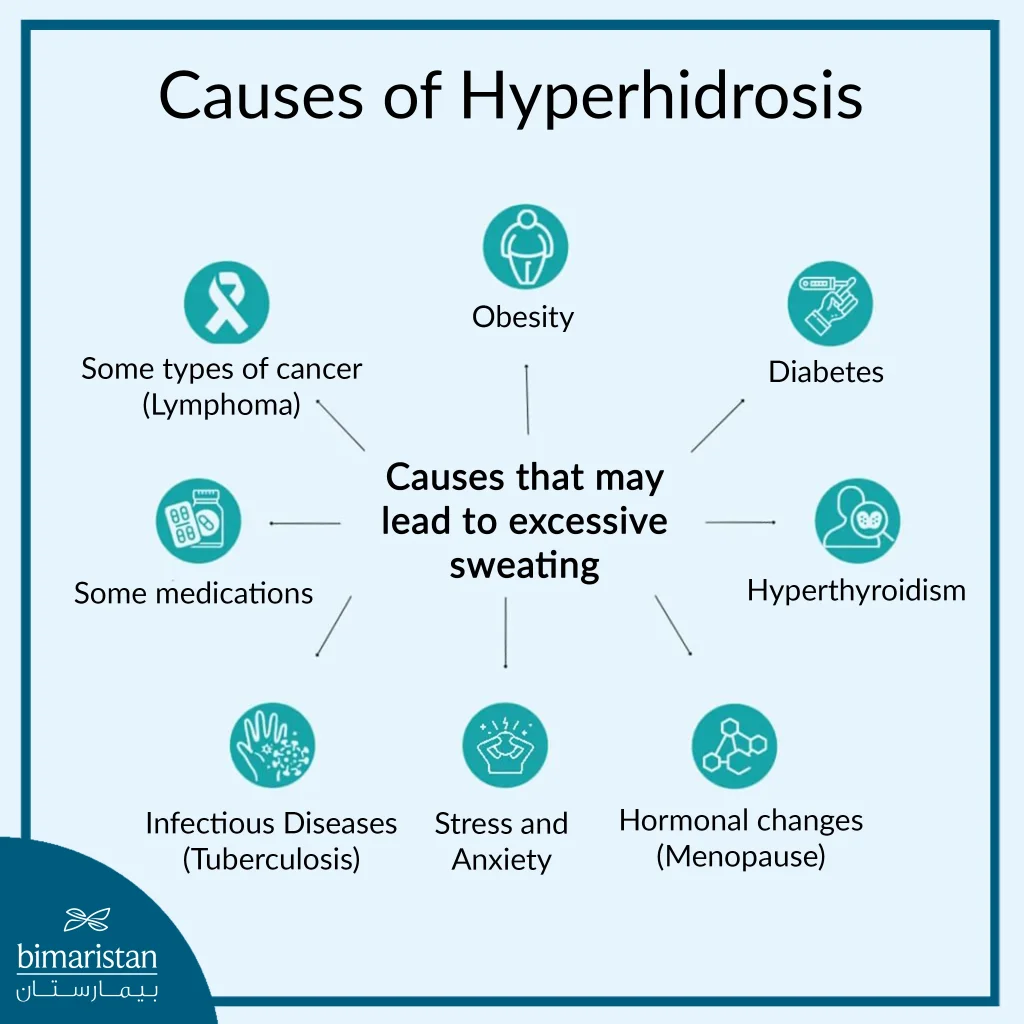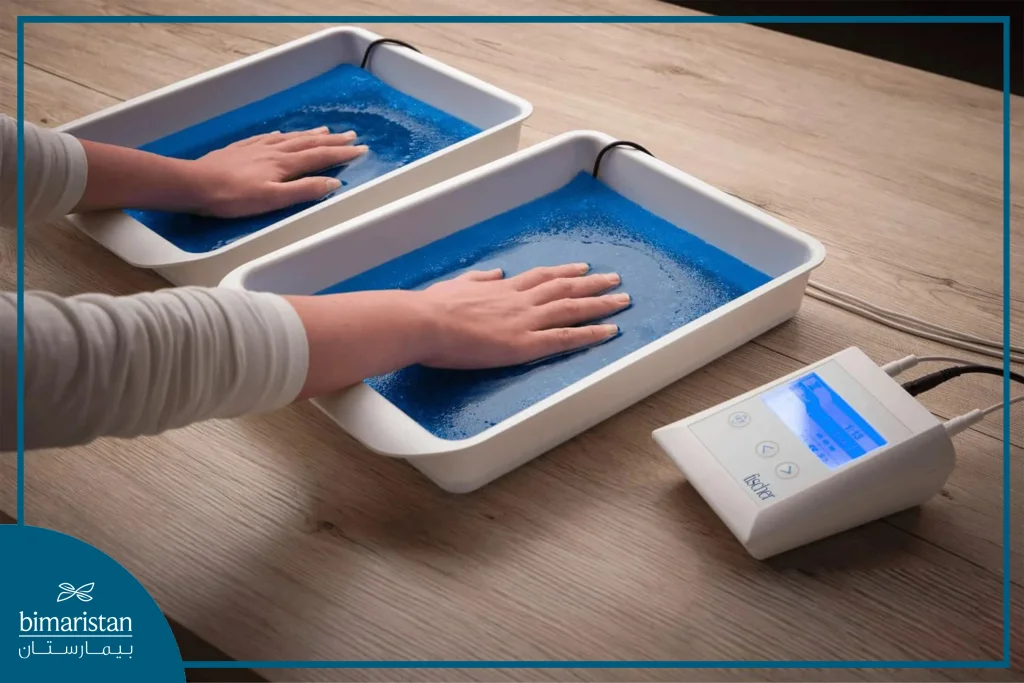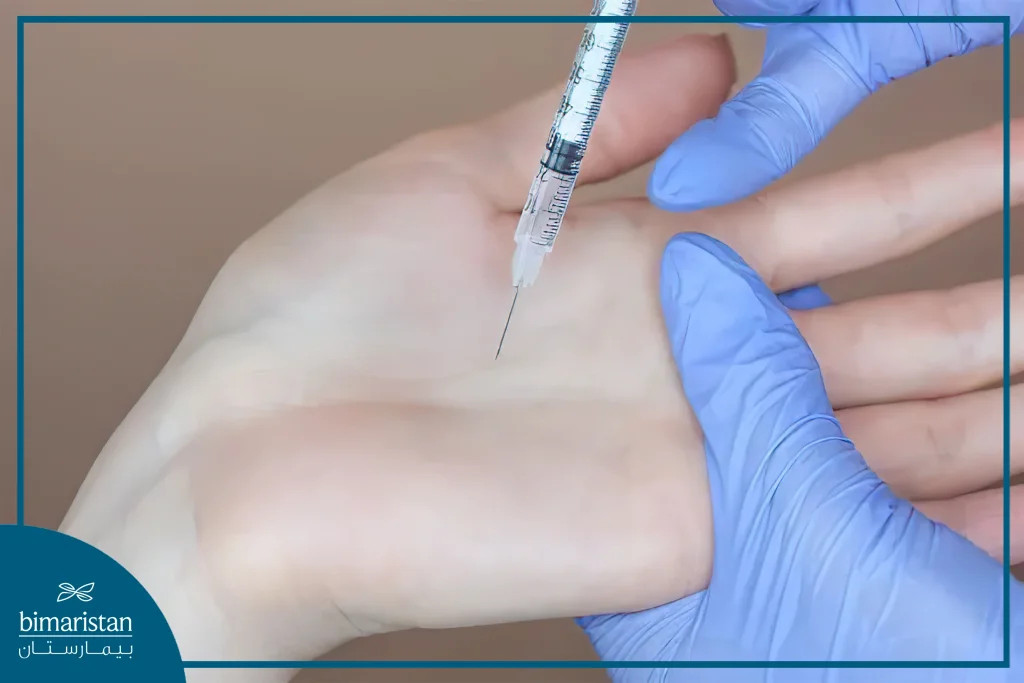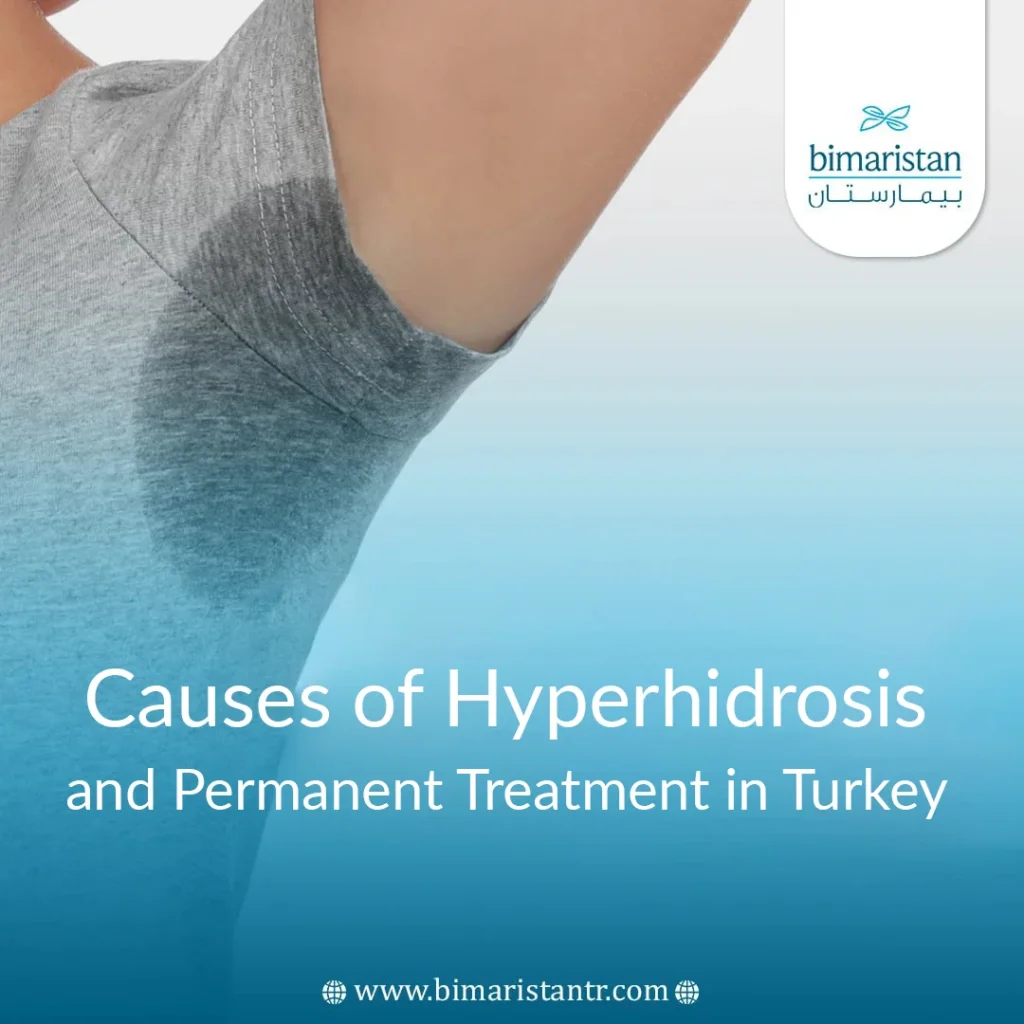Hyperhidrosis can be bothersome and may affect your daily life. So what are its causes, and how can it be treated permanently in Turkey?
Hyperhidrosis, or excessive sweating, can occur due to pathological causes such as hyperthyroidism (secondary sweating) or can be idiopathic or genetic (primary sweating). Therefore, it is essential to investigate the causes of excessive sweating to treat and eliminate the condition.
Hyperhidrosis causes and Its types
Sweating is a natural way for the body to cool down. When the weather is hot or during strenuous physical activities, sweating increases.
A person may suffer from excessive sweating in certain body areas, such as the armpits, face, hands, and feet, known as primary or focal hyperhidrosis. Some common causes of primary hyperhidrosis include:
- Increased sympathetic nervous system activity due to emotional factors such as stress, anxiety, and excitement.
- Consumption of certain foods such as spices, chocolate, peanuts, and coffee, and exposure to certain odors.
People may also be sweating a lot all over the body due to metabolic disorders that raise body temperature. This condition is called generalized (secondary) hyperhidrosis. Some common causes of secondary hyperhidrosis include:
- Heart diseases
- Hyperthyroidism
- Hypoglycemia
- Parkinson’s disease
- Diabetes
- Lymphoma
- Gout and rheumatoid arthritis
- Obesity
- Strokes
- Spinal cord injuries
- Infectious diseases such as tuberculosis
- Some medications
From the above, we can conclude that primary hyperhidrosis does not have a clear cause but is a combination of predisposing factors believed to be genetic in the patient. On the other hand, secondary hyperhidrosis is caused by medical disorders that can be identified and treated.

Causes of hyperhidrosis in women
Increased sweating in females happens for natural causes related to hormonal changes. One of the causes of increased sweating in women is hot flashes that occur after menopause.
Hyperhidrosis can occur during pregnancy for several reasons, including high blood pressure, hormonal fluctuations, weight gain, anxiety, and psychological stress. However, there is no need to worry about excessive sweating during pregnancy, as it is a natural occurrence and rarely indicates an underlying disease.
Another common cause of excessive sweating in women is hyperthyroidism. Women are more likely than men to suffer from this condition.
Psychological factors also play a significant role in increased sweating. Emotions and stress increase the activity of the sympathetic nervous system, which is responsible for increased sweating.
Severe sweating causes in men
Many men worldwide suffer from excessive sweating. According to a study conducted in the United States, 5% of men suffer from excessive sweating.
Men sweat more than women because their sweat glands are more active. Additionally, men have higher internal body temperature due to larger muscle mass.
Studies have shown that a decrease in testosterone levels is associated with severe night sweating in men.
A significant cause of secondary excessive sweating in males is acromegaly, a condition caused by increased secretion of growth hormone from the pituitary gland, leading to physical enlargement in affected individuals, resulting in sweating too much.
As mentioned earlier in our article, many secondary causes of excessive sweating and sweaty armpits in men exist. As for primary sweating, it is also expected and is often associated with the presence of psychological disorders or problems such as constant anxiety and stress.
Causes of heavy sweating during sleep
Some people suffer from excessive perspiring at night during sleep, waking up to find their clothes and pillow soaked in sweat. Many conditions can lead to night sweats, including:
- Low blood sugar
- Psychological problems such as anxiety
- Taking certain medications such as antidepressants and painkillers
- Hormone replacement therapy
- Autoimmune disorders
- Cancerous tumors
- Osteomyelitis
- Pheochromocytoma
- Alcohol or drug abuse
- Menopause in women
Non-surgical hyperhidrosis treatment
Regarding cases of secondary severe sweating, treatment focuses on solving the underlying problems causing excessive sweating, such as managing hyperthyroidism, which can cure hyperhidrosis.
As for primary excessive sweating, treatment often relies on alleviating the symptoms of the disease and avoiding sweating triggers. Some ways to treat primary hyperhidrosis include:
Lifestyle changes
Modifying the daily routine helps reduce hyperhidrosis in its early stages. These changes include:
- Wearing loose clothing made of breathable fabric and avoiding tight clothes
- Avoiding consumption of spicy foods
- Wearing shoes made of leather or fabric instead of synthetic materials
- Avoiding prolonged and intense exposure to sunlight
- Increasing cold water showers
Antiperspirants
These work by blocking the sweat gland ducts, preventing your body from producing sweat. Your doctor may prescribe an antiperspirant containing aluminum chloride, which is more effective than over-the-counter antiperspirants in pharmacies.
These products are available as sprays or creams with a gel-like texture. These preparations may cause side effects, such as skin irritation at the application site.
Anticholinergic medications
This method is used to manage severe cases of excessive sweating. These medications work by inhibiting the action of acetylcholine, a neurotransmitter that stimulates sweat gland activity.
Anticholinergics may take about two weeks to take effect, and they can cause several side effects, such as constipation, dizziness, dry mouth, and blurred vision due to tear inhibition.
Iontophoresis
A dermatologist may resort to iontophoresis when previous treatments fail to manage severe sweating. This technique effectively treats sweaty hands and feet and, to a lesser extent, sweaty armpits.
It involves immersing the hands or feet in a water-filled container with a device emitting electrical charges at the bottom. Over time, these charges block the sweat glands. This procedure is usually not painful, but some patients may experience a tingling sensation or skin irritation.

Botox for hyperhidrosis
Botox has recently become widespread as one of the prominent treatments used in Aesthetic (cosmetic) medicine. It also treats excessive sweating, especially in the armpit area (armpit botox).
It works by intercepting signals sent from the nervous system to the sweat glands, reducing the amount of sweat produced.
Botox injections are administered in the area where there is excessive sweating, and after a period estimated at 30 to 45 minutes post-injection, the sweat glands cease functioning. This cessation typically lasts an average of 6 months, so repeat injections will be necessary.

How to treat hyperhidrosis permanently in Turkey
When non-surgical methods fail to treat severe sweating, and the patient wishes to address this issue earnestly, the option of undergoing surgery can be discussed. Generally, the cost of treating hy[erhidrisis in Turkey starts from $3000 US Dollars and varies from patient to patient depending on their condition and the surgical technique used in their treatment.
Endoscopic surgery for treating severe sweating
The procedure involves cutting the sympathetic nervous system responsible for stimulating the sweat glands. It is used to manage heavy sweating of the hands, face, and armpits and rarely for excessive sweating of the feet due to potential serious side effects such as loss of sexual function.
The surgery is performed under general anesthesia by making surgical incisions around the chest area. The surgeon inserts a scope and other surgical instruments through the incisions to obtain a clear view of the sympathetic chain responsible for innervating the sweat glands.
The surgeon then removes a portion of this chain, reducing excessive sweating. This surgery involves some risks, which the medical staff will thoroughly explain before determining the procedure. You can read more about hyperhidrosis treatment in Turkey.
This procedure is suitable for many patients looking for permanent excessive hidrosis treatment. The surgery has been successfully performed for many individuals at Bimaristan Medical Center. If you want more information, you can contact us.
In conclusion, the appropriate treatment depends on the causes of excessive sweating. Identifying the cause is the first step, followed by discussing the available options for each patient with a specialist doctor. There is no need to hide the problem of excessive sweating and pretend it does not exist out of fear of society’s judgment, as it is a common issue among many people.
References:
- Hyperhidrosis: causes and treatment options, Department of Dermatology and Venereology, Medical University of Lodz, Poland.
- What is hyperhidrosis? PCDS.

